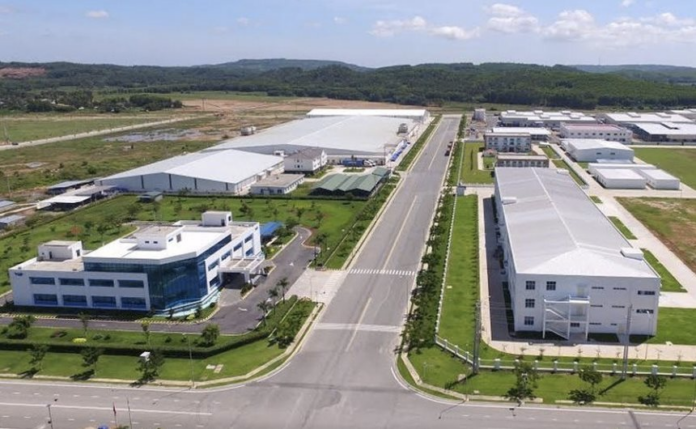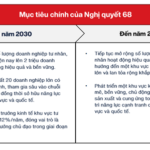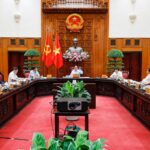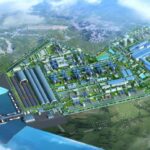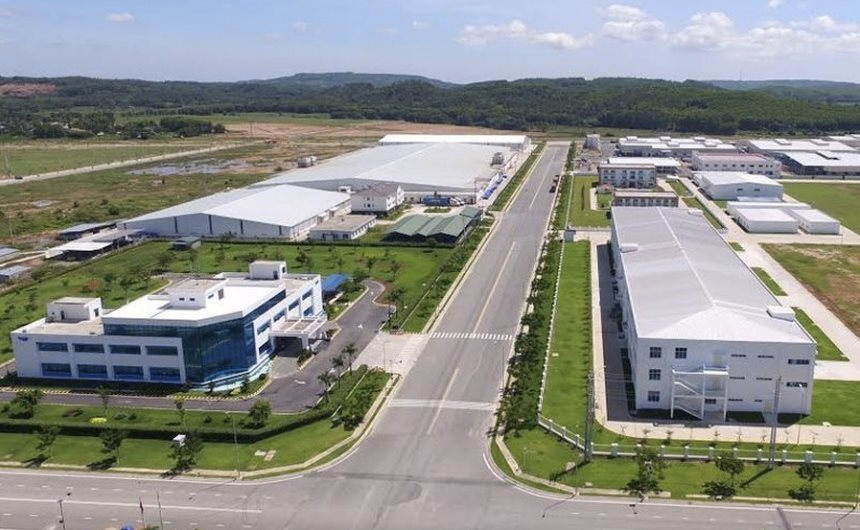
Resolution 68 sets out approximately 80 priority policy groups related to resource access.
Specifically, regarding land and production premises – one of the biggest challenges for businesses today – the Resolution stipulates that each locality must set aside a corresponding fund of land in industrial parks and clusters, with an area of approximately 20 hectares or a minimum of 5% of clean land that has been invested in infrastructure, exclusively for small and medium-sized enterprises and innovative start-up enterprises.
In addition, these enterprises will enjoy a 30% reduction in land rent for a term of 5 years. For infrastructure businesses that provide land and offer reduced land prices to these priority objects, they will be entitled to deduct this amount from their land tax payments. This is a concrete solution to facilitate enterprises, especially small and medium-sized enterprises, in accessing land and addressing the previous situation where infrastructure enterprises mainly prioritized leasing to large enterprises, making it difficult for small and medium-sized enterprises with more limited demands and capacities to access land.
Although previously, Decree No. 35/2022/ND-CP on the management of industrial parks and economic zones also stipulated the allocation of a certain proportion (3% or 5% of the area) for small businesses, the implementation has not been truly effective. This time, the Resolution provides more specific and breakthrough regulations.
Another issue of great concern to enterprises is access to capital. The Resolution also clearly states that mechanisms and policies must be established, including a dedicated trade credit channel for small and medium-sized enterprises, start-ups, newly established enterprises, and enterprises operating in priority areas such as digital transformation and green transition. At the same time, there must be mechanisms to support interest rates for these enterprises when necessary, possibly through state support funds, to help them access capital and reduce capital costs.
Deputy Prime Minister Nguyen Chi Dung shared that we also boldly propose mechanisms to allow the use of more flexible forms of security, such as unsecured loans or assets formed in the future, so that enterprises, especially small and medium-sized enterprises – those that often lack traditional collateral – can access bank loans. Previously, this was very difficult, and interest rates were high. The Resolution has expanded the regulations to enable commercial banks to consider lending more conveniently and at lower costs…
Regarding financial measures, the Resolution proposes to abolish the business license tax. In addition, newly established enterprises will be exempt from corporate income tax for 3 years from the start of their operations and will also be exempt from workshop rental fees for the first 3 years.
Moreover, according to Deputy Prime Minister Nguyen Chi Dung, there is another issue that has a very important impact on enterprises and this business area. It is that the State must ensure its role in creating development and must not intervene with administrative measures that contradict the principles of the market and distort the principles of the market economy.
Regarding the reduction of administrative procedures and the creation of a favorable and attractive investment and business environment, the Resolution stipulates very specifically: Right in the year 2025, it is necessary to ensure a reduction of at least 30% in the time for handling administrative procedures, 30% in business conditions, and 30% in compliance costs for enterprises.
Regarding the deployment requirements, the Politburo, the General Secretary, and the Prime Minister have directed that after the issuance of Resolution 68/NQ-TW, specific implementation must be carried out immediately, and it must be quickly put into life. Therefore, in the next few days, according to Deputy Prime Minister Nguyen Chi Dung, the Ministry of Finance – the agency assigned to chair the construction of this project – will submit to the Government the Government’s action program to implement the Resolution, along with a draft Resolution of the National Assembly to institutionalize the contents of Resolution 68.
“We will also soon organize a national conference to propagate this important Resolution,” emphasized the Deputy Prime Minister.
Unlocking Vietnam’s Economic Potential: Resolution 68 and the Rise of the Private Sector
The Politburo has issued Resolution 68 – a significant directive that is expected to bring about a major shift in the orientation of private sector development in Vietnam. Marked as a historic turning point, this Resolution elevates the private sector’s status, clearly recognizing it as the “most important driving force of the national economy.”
How to Instill Confidence in People to Invest Their Money?
The proposal to develop a Law on Private Economic Development is an exciting and much-anticipated development. This law has the potential to revolutionize the economic landscape, offering a unified policy framework and resolving long-standing contradictions and overlaps that have hindered businesses. With this law, we can expect a new era of economic growth and a more conducive environment for private enterprises to thrive.
“Dr. Nguyen Van Dinh: Resolution 68 Becomes a ‘Revolution’ for the Real Estate Market”
“The renowned academic, Dr. Nguyen Van Dinh, highlights the groundbreaking nature of Resolution 68, describing it as a ‘true revolution in mechanism’. This resolution marks a pivotal moment as, for the first time, a high-level document emphatically acknowledges the pivotal role of private enterprises.
‘Shortcuts to Success’ in Vietnam Has Never Been This Obvious
The resolution No. 68-NQ/TW, issued by the Political Bureau on May 4, 2025, marks a pivotal turning point for the development of the private economy. This landmark resolution introduces a comprehensive set of solutions aimed at eliminating red tape, enhancing protection for businesses entering the market, and unleashing the full potential of economic resources.
“Unleashing Private Sector Growth: A Call for Swift Legislative Action”
“On the afternoon of May 7th, with a sense of urgency to implement Resolution 68 of the Politburo on private sector development, Prime Minister Pham Minh Chinh chaired a meeting of the Government’s Standing Committee on drafting a resolution of the National Assembly on special mechanisms and policies for private sector development. This pivotal gathering underscores the government’s commitment to fostering a thriving and vibrant private economy, recognizing its vital role in driving Vietnam’s economic growth and prosperity.”

